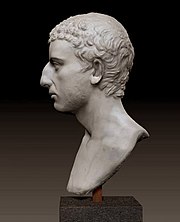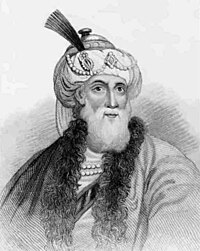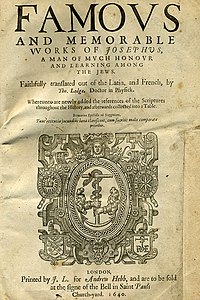Josephus
From Wikipedia, the free encyclopedia

Josephus (AD 37 – c. 100),[2] also known as Yosef Ben Matityahu (Joseph, son of Matthias) and, after he became a Roman citizen, as Titus Flavius Josephus,[3] was a first-century Jewish historian and apologist of priestly and royal ancestry who survived and recorded the destruction of Jerusalem in AD 70[4]. His works give an important insight into first-century Judaism.
Josephus's two most important works are The Jewish War (c. 75) and Antiquities of the Jews (c. 94).[5] The Jewish War recounts the Jewish revolt against Rome (66–70). Antiquities of the Jews recounts the history of the world from a Jewish perspective. These works provide valuable insight into first century Judaism and the background of early Christianity.[5]
Josephus, who introduced himself in Greek as "Iosepos (Ιώσηπος), son of Matthias, an ethnic Jew, a priest from Jerusalem",[6] fought the Romans in the First Jewish-Roman War of 66–73 as a Jewish military leader in Galilee. After the Jewish garrison of Yodfat was taken under siege, the Romans invaded, killing thousands; the survivors committed suicide.
According to Josephus, however, in circumstances that are somewhat unclear, Josephus found himself trapped in a cave with forty of his companions. The Romans asked him to surrender once they discovered where he was, but his companions refused to allow this. He therefore suggested a method of collective suicide: they draw lots and killed each other, one by one, counting to every third person. The sole survivor of this process was Josephus (this method as a mathematical problem is referred to as the Josephus problem, or Roman Roulette [7]) Josephus and one of his soldiers then surrendered to the Roman forces invading Galilee in July 67 and became prisoners. The Roman forces were led by Flavius Vespasian and his son Titus, both subsequently Roman emperors. In 69, Josephus was released (cf. War IV.622–629) and according to Josephus's own account, he appears to have played a role as a negotiator with the defenders during the Siege of Jerusalem in 70.
In 71, he arrived in Rome in the entourage of Titus, becoming a Roman citizen and client of the ruling Flavian dynasty (hence he is often referred to as Flavius Josephus — see below). In addition to Roman citizenship he was granted accommodation in conquered Judaea, and a decent, if not extravagant, pension. It was while in Rome, and under Flavian patronage, that Josephus wrote all of his known works. Although he only ever calls himself "Josephus", he appears to have taken the Roman praenomen Titus and nomen Flavius from his patrons.[8] This was standard practice for 'new' Roman citizens.
Josephus's first wife perished, together with his parents, in Jerusalem during the siege and Vespasian arranged for him to marry a Jewish woman who had been captured. This woman left Josephus, and around 70, he married a Jewish woman from Alexandria by whom he had three male children. Only one, Flavius Hyrcanus, survived childhood. Josephus later divorced his third wife and around 75, married his fourth wife, a Jewish woman from Crete, member of a distinguished family. This last marriage produced two sons, Flavius Justus and Flavius Simonides Agrippa.
Josephus's life is beset with ambiguity. For his critics, he never satisfactorily explained his actions during the Jewish war — why he failed to commit suicide in Galilee in 67 with some of his compatriots, and why, after his capture, he accepted patronage from the Romans. Yet, none of his critics mentioned the fact that the two leaders of the Jewish zealots, Simon Bar-Giora and John of Giscala, at the moment of truth just before the fall of Jerusalem, declined to commit suicide and accepted Roman captivity.
Historian E. Mary Smallwood wrote:
(Josephus) was conceited, not only about his own learning but also about the opinions held of him as commander both by the Galileans and by the Romans; he was guilty of shocking duplicity at Jotapata, saving himself by sacrifice of his companions; he was too naive to see how he stood condemned out of his own mouth for his conduct, and yet no words were too harsh when he was blackening his opponents; and after landing, however involuntarily, in the Roman camp, he turned his captivity to his own advantage, and benefitted for the rest of his days from his change of side.[9]
Josephus' credibility as a historian is questionable — his works are usually dismissed as Roman propaganda or as a personal or Jewish apologetic, aimed at rehabilitating his reputation in history. More recently, commentators[who?] have reassessed previously-held views of Josephus. As P.J. O'Rourke quipped:
Reason dictates we should hate this man. But it's hard to get angry at Josephus. What, after all, did he do? A few soldiers were tricked into suicide. Some demoralizing claptrap was shouted at a beleaguered army. A wife was distressed... all of which pale by comparison to what the good men did. For it was the loyal, the idealistic and the brave who did the real damage. The devout and patriotic leaders of Jerusalem sacrificed tens of thousands of lives to the cause of freedom. Vespasian and Titus sacrificed tens of thousands of more to the cause of civil order. Even Agrippa II, the Roman client king of Judea who did all he could to prevent the war, ended by supervising the destruction of half a dozen of his cities and the sale of their inhabitants into slavery. How much better for everyone if all the principal figures of the region had been slithering filth like Josephus.[10]
Josephus was an important apologist in the Roman world for the Jewish people and culture, particularly at a time of conflict and tension. He always remained, in his own eyes, a loyal and law-observant Jew. He went out of his way both to commend Judaism to educated Gentiles, and to insist on its compatibility with cultured Graeco-Roman thought. He constantly contended for the antiquity of Jewish culture, presenting its people as civilised, devout and philosophical. Eusebius reports that a statue of Josephus was erected in Rome.[11]
Contents |
[edit] Significance to scholarship

The works of Josephus provide crucial information about the First Jewish-Roman War and are also important literary source material for understanding the context of the Dead Sea Scrolls and post-Second-Temple Judaism. Josephan scholarship in the 19th and early 20th century became focused on Josephus' relationship to the sect of the Pharisees. He was consistently portrayed as a member of the sect, but nevertheless viewed as a villainous traitor to his own nation — a view which became known as the classical concept of Josephus. In the mid 20th century, this view was challenged by a new generation of scholars who formulated the modern concept of Josephus, still considering him a Pharisee but restoring his reputation in part as patriot and a historian of some standing. Scholarship post-1990 sought to move scholarly perceptions forward by demonstrating that Josephus was not a Pharisee but an orthodox Aristocrat-Priest who became part of the Temple Establishment as a matter of deference, and not willing association (cf. Steve Mason 1991).
Josephus includes information about individuals, groups, customs and geographical places. His writings provide a significant, extra-Biblical account of the post-Exilic period of the Maccabees, the Hasmonean dynasty, and the rise of Herod the Great. He makes references to the Sadducees, Jewish High Priests of the time, Pharisees and Essenes, the Herodian Temple, Quirinius' census and the Zealots, and to such figures as Pontius Pilate, Herod the Great, Agrippa I and Agrippa II, John the Baptist, James the brother of Jesus, and a disputed reference to Jesus. He is an important source for studies of immediate post-Temple Judaism (and, thus, the context of early Christianity).
A careful reading of Josephus' writings allowed Ehud Netzer, an archaeologist from Hebrew University, to discover the location of Herod's Tomb, after a search of 35 years — above aqueducts and pools, at a flattened, desert site, halfway up the hill to the Herodium, 12 kilometers south of Jerusalem — exactly where it should have been, according to Josephus's writings.[citation needed]
For many years, the works of Josephus were printed only in an imperfect Latin translation from the original Greek. It was only in 1544 that a version of the Greek text was made available, edited by the Dutch humanist Arnoldus Arlenius. The first English translation, by Thomas Lodge, appeared in 1602, with subsequent editions appearing throughout the 17th century. However, the 1544 Greek edition formed the basis of the 1732 English translation by William Whiston which achieved enormous popularity in the English speaking world (and which is currently available online for free download by Project Gutenberg). Later editions of the Greek text include that of Benedikt Niese, who made a detailed examination of all the available manuscripts, mainly from France and Spain. This was the version used by H. St J. Thackeray for the Loeb Classical Library edition widely used today.
[edit] Works
- (c. 75) War of the Jews, or The Jewish War, or Jewish Wars, or History of the Jewish War (commonly abbreviated JW, BJ or War)
- (date unknown) Josephus's Discourse to the Greeks concerning Hades (spurious; adaptation of "Against Plato, on the Cause of the Universe" by Hippolytus of Rome)
- (c. 94) Antiquities of the Jews, or Jewish Antiquities, or Antiquities of the Jews/Jewish Archeology (frequently abbreviated AJ, AotJ or Ant. or Antiq.)
- (c. 97) Flavius Josephus Against Apion, or Against Apion, or Contra Apionem, or Against the Greeks, on the antiquity of the Jewish people (usually abbreviated CA)
- (c. 99) The Life of Flavius Josephus, or Autobiography of Flavius Josephus (abbreviated Life or Vita)
[edit] The Jewish War
His first work in Rome was an account of the Jewish War, addressed to certain "upper barbarians" – usually thought to be the Jewish community in Mesopotamia – in his "paternal tongue" (War I.3), arguably the Western Aramaic language. He then wrote a seven-volume account in Greek known to us as the Jewish War (Latin Bellum Iudaicum). It starts with the period of the Maccabees and concludes with accounts of the fall of Jerusalem, the Roman victory celebrations in Rome, the mopping-up operations, Roman military operations elsewhere in the Empire and the uprising in Cyrene. Together with the account in his Life of some of the same events, it also provides the reader with an overview of Josephus' own part in the events since his return to Jerusalem from a brief visit to Rome in the early 60s (Life 13–17).
Rome cannot have been an easy place for a Jew to live, in the wake of the suppression of the Jewish revolt. Josephus would have witnessed the marches of Titus' triumphant legions leading their Jewish captives, and carrying treasures from the despoiled Temple in Jerusalem. He would have experienced the popular presentation of the Jews as a bellicose and xenophobic people.
It was against this background that Josephus wrote his War, and although this work has often been dismissed as pro-Roman propaganda (hardly a surprising view, given the source of his patronage), he claims to be writing to counter anti-Judean accounts. He disputes the claim that the Jews served a defeated God, and were naturally hostile to Roman civilization. Rather, he blames the Jewish War on what he calls "unrepresentative and over-zealous fanatics" among the Jews, who led the masses away from their traditional aristocratic leaders (like himself), with disastrous results. Josephus also blames some of the Roman governors of Judea, but these he represents as atypical: corrupt and incompetent administrators. Thus, according to Josephus, the traditional Jew was, should be, and can be, a loyal and peace-loving citizen. Jews can, and historically have, accepted Rome's hegemony precisely because their faith declares that God himself gives empires their power.
[edit] Jewish Antiquities
The next work by Josephus is his twenty-one volume Antiquities of the Jews, completed during the last year of the reign of the Emperor Flavius Domitian (between 1.9.93 and 14.3.94, cf. AJ X.267). He claims that interested persons have pressed him to give a fuller account of the Jewish culture and constitution. Here, in expounding Jewish history, law and custom, he is entering into many philosophical debates current in Rome at that time. Again he offers an apologia for the antiquity and universal significance of the Jewish people.
Beginning with the creation according to Genesis, he outlines Jewish history. Abraham taught science to the Egyptians, who in turn taught the Greeks. Moses set up a senatorial priestly aristocracy, which, like that of Rome, resisted monarchy. The great figures of the biblical stories are presented as ideal philosopher-leaders. There is again an autobiographical Appendix defending Josephus' own conduct at the end of the war when he cooperated with the Roman forces.
[edit] Against Apion
Josephus' Against Apion is a two-volume defence of Judaism as classical religion and philosophy, stressing its antiquity, as opposed to what Josephus claimed was the relatively more recent tradition of the Greeks. Some anti-Judean allegations ascribed by Josephus to the Greek writer Apion, and myths accredited to Manetho are also addressed.
[edit] Literature about Josephus
- The Josephus Trilogy, a novel by Lion Feuchtwanger
- Der jüdische Krieg (Josephus), 1932
- Die Söhne (The Jews of Rome), 1935
- Der Tag wird kommen (The day will come, Josephus and the Emperor), 1942
- Flavius Josephus Eyewitness to Rome's first-century conquest of Judea, Mireille Hadas-lebel, Macmillan 1993, Simon and Schuster 2001
- The 2000 Year Old Middle East Policy Expert, Give War A Chance, P J O'Rourke[12]
[edit] See also
- Josephus on Jesus
- Josippon
- Josephus problem — a mathematical problem named after Josephus.
- Arrius Piso
[edit] References
- The Works of Josephus, Complete and Unabridged New Updated Edition Translated by William Whiston, A.M., Peabody, MA: Hendrickson Publishers, Inc., 1987. ISBN 0-913573-86-8 (Hardcover). ISBN 1-56563-167-6 (Paperback).
- O'Rourke, P.J. Give War a Chance. Vintage, 1993.
- Per Bilde. Flavius Josephus between Jerusalem and Rome: his Life, his Works and their Importance. Sheffield, 1998.
- Shaye J.D. Cohen. Josephus in Galilee and Rome. His Vita and development as a historian. Columbia Studies in the Classical tradition 8 (1979 Leiden).
- Louis Feldman. "Flavius Josephus revisited. The man, his writings, and his significance." Aufstieg und Niedergang der Römischen Welt 21.2 (1984).
- Steve Mason, Flavius Josephus on the Pharisees (1991 Leiden).
- Flavius Josephus: Translation and Commentary, 10 vols. in 12 (Leiden, 2000–).
[edit] Footnotes
- ^ Plagnieux, P. 'Les sculptures Romanes' Dossiers d'Archéologie (January 2001) pg 15
- ^ Louis H. Feldman, Steve Mason (1999). Flavius Josephus. Brill Academic Publishers.
- ^ Josephus refers to himself in his Greek works as Ἰώσηπος :Iōsēpos Matthiou pais (Josephus the son of Matthais). Although Josephus also spoke Aramaic and most probably also Hebrew, no extant sources record his name in these languages. However, his Hebrew/Aramaic name has gone down in Jewish history as יוסף בן מתתיהו (Yosef ben Matityahu) and thus he is commonly known in Israel today.
- ^ See also Jerusalem’s Model in the Late 2nd Temple Period
- ^ a b Stephen L. Harris, Understanding the Bible, (Palo Alto: Mayfield, 1985).
- ^ Jewish War I.3
- ^ Cf. this example, Roman Roulette.
- ^ Attested by the third century Church theologian Origen (Comm. Matt. 10.17).
- ^ Josephus, Flavius, The Jewish War, tr. G.A. Williamson, introduction by E. Mary Smallwood. New York, Penguin, 1981, p. 24
- ^ O'Rourke 104.
- ^ Ecclesiastical History 3.9.2
- ^ O'Rourke, P.J. Give War a Chance. Vintage, 1993.
[edit] External links
| Wikiquote has a collection of quotations related to: Josephus |
- Resources > Second Temple and Talmudic Era > Flavius Josephus The Jewish History Resource Center — Project of the Dinur Center for Research in Jewish History, The Hebrew University of Jerusalem
- The Works of Flavius Josephus Translated by William Whiston
- Works by Josephus at Project Gutenberg
- Flavius Josephus, Judaea and Rome: A Question of Context
- PACE Josephus: text and resources in the Project on Ancient Cultural Engagement at York University
- Flavius Josephus at livius.org
- Josephus Flavius at Jewish Virtual Library




